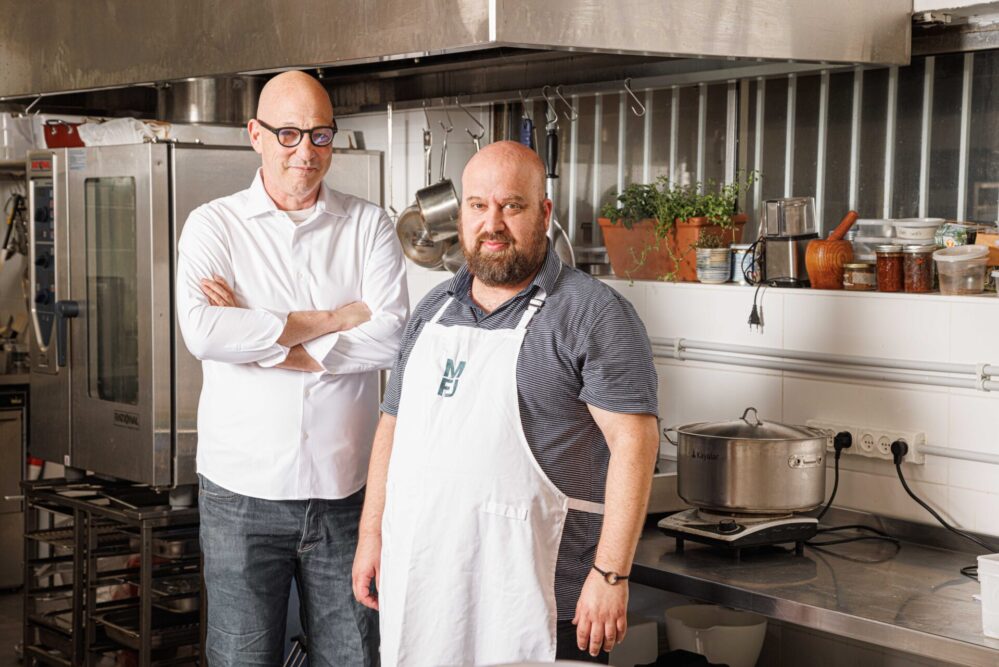Israeli startup Mediterranean Food Lab (MFL) has raised a $17 million series A round to scale up novel solid state fermentation technology to create flavor ingredients it claims can transform the sensory experience of eating plant-based foods.
The funding round was led by Gullspång Re:food, together with PeakBridge, Arancia International, and FoodBridge, among others, and will help MFL scale up industrial production and build a sales team to lead the commercialization of its ingredients to foodservice and CPG companies in Europe.
A combination of art and science
Cofounded by B.Z. Goldberg, Yair Yosefi and Omer Ben-Gal in 2019, MFL combines solid state fermentation technology with an AI-driven computational platform to create clean label savory ingredients that give depth, body, and meaty flavors to everything from bean-based dishes to plant-based meat analogs.
MFL first uses microbes to eat away at a substrate such as grains or legumes or food industry waste streams, and then uses the enzymes that are produced to serve as biocatalysts in a second fermentation stage, creating ingredients that would be listed as, for example, ‘fermented chickpea’ instead of ‘natural flavors.’
While solid state fermentation has been used for centuries (think natto and kimchi), MFL turns it from an art to a science, using its machine learning platform to understand what to put in, in order to get something very specific out of the end of the fermentation process, Goldberg told AgFunderNews.
“Some of the world’s most delicious foods are created using fermentation. But it took thousands of years of trial and error to have the right microorganism, conditions, and substrate necessary to create wine or beer or Parmesan cheese. We know we can create incredibly meaty, cheesy, buttery, and more sensorial experiences by fermenting plant material, but we don’t have 5,000 years. We need to create radically delicious options for meatless eating now.
“Therefore we use AI/ML to make these kinds of choices. We also use AI to discover correlations between molecules and sensorial qualities – including correlations not yet discovered. We use data science to help us make better flavor blends and formulations, to track and improve production processes and more.
“We are building a unique data asset that will allow us, in the future, to be more efficient and accurate at extending our portfolio and providing our customers with next-gen flavor solutions based on true consumer needs.”

A world of complexity
Each MFL ingredient has a unique fingerprint of volatile (aroma) and non-volatile (taste, mouthfeel, and body) molecules, which creates its multi-layered taste profile, he explained. “All the enzymes involved in the process are created as part of the process, not added by us.”
This is very different from the approach of the flavor industry, which is largely built on synthesizing individual molecules, and aggregating them into flavor solutions that might contain one or maybe a few dozen molecules, he said. “That’s very limited compared to the thousands of molecules that are released when meat is cooked, and which are responsible for the deliciousness of animal protein.”
He added: “The complexity of our process plus the non-linear and non-additive nature of the flavor and aroma world dictates the need to make very smart decisions regarding the combination of the microorganisms we use (including genomic data and understanding of metabolic pathways); the substrate qualities; fermentation conditions; and downstream processing parameters.”
Labeling and regulation: Foodstuffs and ingredients, not flavors and additives
As for labeling, he said, MFL’s ingredients are regulated as ‘foodstuffs’ in the EU and food ingredients in the US.
“They are not novel foods, but they are also not additives, meaning they’re free of all the ingredients that exist in the flavor industry. Even so-called ‘natural flavors’ often contain synthetic solvents, synthetic emulsifiers, synthetic carriers, and synthetic preservatives. With our process you get a clean label; one that might read ‘fermented chickpea’ or ‘fermented lentil broth,’ for example.”
The go to market strategy
While MFL plans to look at the US and Asia Pacific markets in the coming years, its initial focus is Europe, he said. “As we are currently scaling production in the Netherlands and building an R&D center in France, it makes sense to begin commercialization close to home.
“European consumers are known as health-conscious and for seeking foods that are clean label, healthy, and free from artificial additives and preservatives. European consumers are also increasingly adopting flexitarian (less animal-protein-based) diets for health, environmental, and ethical reasons.”

Food applications
There is a vast range of potential food applications for MFL ingredients, far beyond meat alternatives, he claimed.
“Our solutions work great in meat analogs and provide the missing ‘meatiness’ and complexity to plant-protein-based matrices; but are also very potent in dishes traditionally prepared with animal protein or meaty stocks. Those include stocks, soups, stews, lasagna, bolognese, and a variety of sauces such as tomato, cream, and béchamel. In the long term, the potential of this sector is significantly bigger than the meat analog market.”
Yoni Glickman, a member of the MFL board and managing partner at FoodSparks, Peakbridge’s seed-stage investment vehicle with EIT Food, said: “From the first time we met the team and tasted the products, we immediately understood how this team and technology can be a huge driver in overcoming one of the most significant barriers to plant-based eating namely, the insufficient sensory experience.”





